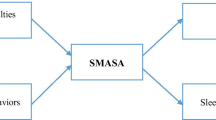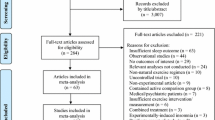Abstract
Objectives
To investigate whether the association between SJLsc (sleep-corrected social jetlag) and depressive mood is significant and independent of sleep debt.
Methods
Participants from the general adult population were interviewed using structured questionnaires on sleep duration, weekday/weekend sleep schedules, and depressive mood (Patient Health Questionnaire-9). Social jetlag (SJL) was measured by SJLsc and standard SJL (SJLs). SJLs was the absolute difference between mid-sleep time on free days (MSF) and workdays (MSW). For SJLsc, both MSF and MSW were adjusted for average sleep duration across the week according to the direction of sleep debt. Sleep debt was defined by sleep extension on free days. The association of SJL with depression was investigated, and covariates included age, sex, sociodemographic factors, insomnia symptoms, sleep duration, and sleep debt.
Results
A total of 1982 individuals (1089 men; age 43.1 ± 14.4 years) were analyzed. SJL was present in 24.6% measured by SJLsc and 51.0% by SJLs. SJLsc and SJLs were significantly associated with depressive mood (r = 0.06, P = 0.02; r = 0.06, P = 0.01, respectively), independent of sleep debt. Sleep debt was also associated with depression (r = 0.07, P < 0.01).
Conclusions
By adopting sleep-corrected formula for SJL, this study found that misaligned and insufficient sleep, at levels occurring in routine social life, can negatively affect mood. Minimizing social jetlag and sleep deprivation may promote individual psychological well-being.


Similar content being viewed by others
Data availability
The datasets generated during the current study are available from the corresponding author upon reasonable request.
References
Wittmann M, Dinich J, Merrow M et al (2006) Social jetlag: misalignment of biological and social time. Chronobiol Int 23(1-2):497–509
Roepke SE (2010) Duffy JF (2010) Differential impact of chronotype on weekday and weekend sleep timing and duration. Nat Sci Sleep 2:213–220
Korczak A, Martynhak B, Pedrazzoli M et al (2008) Influence of chronotype and social zeitgebers on sleep/wake patterns. Braz J Med Biol Res 41(10):914–919
Rutters F, Lemmens SG, Adam TC et al (2014) Is social jetlag associated with an adverse endocrine, behavioral, and cardiovascular risk profile? J Biological Rhythms 29(5):377–383
Koopman AD, Rauh SP, van ‘t Riet E et al (2017) The association between social jetlag, the metabolic syndrome, and type 2 diabetes mellitus in the general population: the new Hoorn study. J Biol Rhythms 32(4):359–368
Roenneberg T, Allebrandt KV, Merrow M et al (2012) Social jetlag and obesity. Curr Biol 22(10):939–943
Parsons MJ, Moffitt TE, Gregory A et al (2015) Social jetlag, obesity and metabolic disorder: investigation in a cohort study. Int J Obes (Lond) 39(5):842–848
Jankowski KS (2017) Social jet lag: sleep-corrected formula. Chronobiol Int 34(4):531–535
Roenneberg T, Pilz LK, Zerbini G et al (2019) Chronotype and social jetlag: a (self-) critical review. Biology 8(3):54
Levandovski R, Dantas G, Fernandes LC et al (2011) Depression scores associate with chronotype and social jetlag in a rural population. Chronobiol Int 28(9):771–778
Islam Z, Hu H, Akter S et al (2020) Social jetlag is associated with an increased likelihood of having depressive symptoms among the Japanese working population: the Furukawa Nutrition and Health Study. Sleep 43(1):zsz204
Min J, Jang T-W, Lee H-E et al (2023) Social jetlag and risk of depression: results from the Korea National Health and Nutrition Examination Survey. J Affect Disord 323:562–569
Keller LK, Grunewald B, Vetter C et al (2017) Not later, but longer: sleep, chronotype and light exposure in adolescents with remitted depression compared to healthy controls. Eur Child Adolesc Osychiatry 26(10):1233–1244
Mathew GM, Hale L, Chang A-M (2019) Sex moderates relationships among school night sleep duration, social jetlag, and depressive symptoms in adolescents. J Biol Rhythms 34(2):205–217
Hwangbo Y, Kim W-J, Chu MK et al (2013) Association between weekend catch-up sleep duration and hypertension in Korean adults. Sleep Med 14(6):549–554
Kroenke K, Spitzer RL (2002) The PHQ-9: a new depression diagnostic and severity measure. Psychiatr Ann 32:509–515
Bastien CH, Vallières A, Morin CM (2001) Validation of the Insomnia Severity Index as an outcome measure for insomnia research. Sleep Med 2(4):297–307
Juda M, Vetter C, Roenneberg T (2013) Chronotype modulates sleep duration, sleep quality, and social jet lag in shift-workers. J Biol Rhythms 28(2):141–151
Roenneberg T, Wirz-Justice A, Merrow M (2003) Life between clocks: daily temporal patterns of human chronotypes. J Biol Rhythms 18(1):80–90
Roepke SE (2010) Duffy JF (2010) Differential impact of chronotype on weekday and weekend sleep timing and duration. Nat Sci Sleep 2:213–220
Henderson SE, Brady EM, Robertson N (2019) Associations between social jetlag and mental health in young people: a systematic review. Chronobiol Int 36(10):1316–1333
Knapen SE, Riemersma-Van der Lek RF et al (2018) Social jetlag and depression status: results obtained from the Netherlands Study of Depression and Anxiety. Chronobiol Int 35(1):1–7
Henderson SEM, Brady EM, Robertson N (2019) Associations between social jetlag and mental health in young people: a systematic review. Chronobiol Int 36(10):1316–1333
Okajima I, Komada Y, Ito W et al (2021) Sleep debt and social jetlag associated with sleepiness, mood, and work performance among workers in Japan. Int J Environ Res Public Health 18(6):2908
de Souza CM, Hidalgo MPL (2014) Midpoint of sleep on school days is associated with depression among adolescents. Chronobiol Int 31(2):199–205
Randler C, Stadler L, Vollmer C, Diaz-Morales JF (2012) Relationship between depressive symptoms and sleep duration/chronotype in women. J Indivi Diff 33(3):186–191
Kelly RM, Finn J, Healy U et al (2020) Greater social jetlag associates with higher HbA1c in adults with type 2 diabetes: a cross sectional study. Sleep Med 66:1–9
Spiegel K, Leproult R, Van Cauter E (1999) Impact of sleep debt on metabolic and endocrine function. Lancet 354(9188):1435–1439
Matthews KA, Dahl RE, Owens JF et al (2012) Sleep duration and insulin resistance in healthy black and white adolescents. Sleep 35(10):1353–1358
Gangwisch JE, Malaspina D, Babiss LA et al (2010) Short sleep duration as a risk factor for hypercholesterolemia: analyses of the National Longitudinal Study of Adolescent Health. Sleep 33(7):956–961
Hall MH, Muldoon MF, Jennings JR et al (2008) Self-reported sleep duration is associated with the metabolic syndrome in midlife adults. Sleep 31(5):635–643
Gottlieb DJ, Redline S, Nieto FJ et al (2006) Association of usual sleep duration with hypertension: the Sleep Heart Health Study. Sleep 29(8):1009–1014
Amagai Y, Ishikawa S, Gotoh T et al (2004) Sleep duration and mortality in Japan: the Jichi medical school cohort study. J Epidemiol 14(4):124–128
Kripke DF, Garfinkel L, Wingard DL et al (2002) Mortality associated with sleep duration and insomnia. Arch Gen Psychiatry 59(2):131–136
Im H-J, Baek S-H, Chu MK et al (2017) Association between weekend catch-up sleep and lower body mass: population-based study. Sleep 40(7):zsx089
Killick R, Hoyos CM, Melehan KL et al (2015) Metabolic and hormonal effects of ‘catch-up’ sleep in men with chronic, repetitive, lifestyle-driven sleep restriction. Clin Endocrinol (Oxf) 83(4):498–507
Depner CM, Melanson EL, Eckel RH et al (2019) Ad libitum weekend recovery sleep fails to prevent metabolic dysregulation during a repeating pattern of insufficient sleep and weekend recovery sleep. Curr Biol 29(6):957–967
Funding
This study was supported by grants from the Korean Neurological Association (KNA-10-MI-03), Republic of Korea.
Author information
Authors and Affiliations
Contributions
Study design: C-H Yun. Data acquisition: MK Chu, KI Yang, WJ Kim, Hwang, and Dana Oh. Statistical analysis: H-J Im. Manuscript preparation and editing: H-J Im and C-H Yun. Manuscript revision/review: MK Chu, KI Yang, WJ Kim, RJ Thomas, JE Yoon, and C-H Yun. The corresponding author attests that all listed authors meet authorship criteria and that no other meeting authorship criteria have been omitted.
Corresponding author
Ethics declarations
Ethics approval
This study was performed in accordance with the Declaration of Helsinki. The study protocol was approved by the Institutional Review Board of Seoul National University Bundang Hospital (approval no: B-1602-334-008).
Informed consent
Informed consent was obtained from all participants.
Conflict of interest
The authors declare no competing interests.
Additional information
Publisher’s note
Springer Nature remains neutral with regard to jurisdictional claims in published maps and institutional affiliations.
Supplementary information
ESM 1
(DOCX 18 kb)
Rights and permissions
Springer Nature or its licensor (e.g. a society or other partner) holds exclusive rights to this article under a publishing agreement with the author(s) or other rightsholder(s); author self-archiving of the accepted manuscript version of this article is solely governed by the terms of such publishing agreement and applicable law.
About this article
Cite this article
Im, HJ., Chu, M.K., Yang, K.I. et al. The association between social jetlag and depression is independent of sleep debt. Sleep Breath 27, 2459–2467 (2023). https://doi.org/10.1007/s11325-023-02849-6
Received:
Revised:
Accepted:
Published:
Issue Date:
DOI: https://doi.org/10.1007/s11325-023-02849-6




